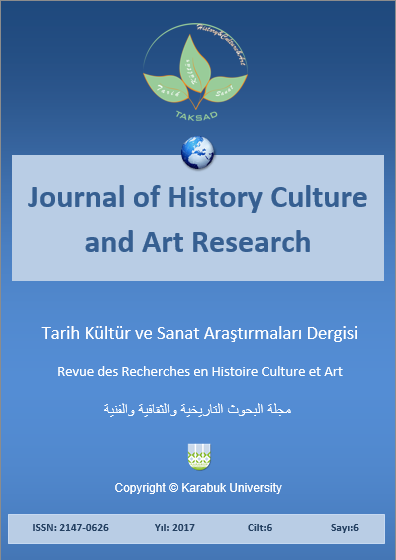Musical Education in Kazan in 1917-1960: Periodization Problem
DOI:
https://doi.org/10.7596/taksad.v6i6.1332Keywords:
History, Volga region, Kazan, Tatar autonomous Soviet Socialist Republic (TASSR), Musical education, Kazan state conservatory.Abstract
This article is devoted to justification of a periodization in music history education in Kazan and TACCP from revolutionary events of 1917 to foundation of high special music school at the Kazan State Conservatory in 1960. The research implements historical & genetic and historical & comparative methods. Justification of specifics of historical and cultural processes in the region during the declared period and about applicability of a three-part periodization, the bases for which will be cultures of the decision of the political and party management, external for the sphere, is presented. Characteristic of Kazan was the fact that till 1960 the musical school was the only educational institution in TASSR providing secondary vocational music education. Conclusions are drawn that formation of new system of musical education began at the beginning of the 20th century, and local features were considered fully. The policy for the non-Russian population pursued by the Soviet power promoted further development of music education. The conducted research also showed that in Kazan synthesis of capital cultural tradition and regional features was carried out. Materials of article can be of interest to researchers of the USSR during the specified period, experts in history and culture of the Volga region people and history of music education in Eastern Europe.
References
Blumenthal, I. & Benson, C. (1978). Educational reform in the Soviet Union: implications for developing countries. Washington, D.C.: The World Bank.
Faizrakhmanova, L. T. & Kovrikova, E. V. (2017). The Ethno-Confessional Relations in the Context of Culture and Education (Kazan province, XVIII - beginning of XX century). Bylye Gody, 43(1), 30-39.
Fitzpatrick, S. (2002). The Commissariat of Enlightenment: Soviet Organization of Education and the Arts under Lunacharsky, October 1917-1921. Cambridge University Press.
Jaffé, D. (2012). Historical Dictionary of Russian Music. Scarecrow Press.
Lodder, C.; Kokkori, M. & Mileeva, M. (2013). Utopian Reality: Reconstructing Culture in Revolutionary Russia and Beyond. Leiden: Brill.
Martynova, Yu. A. (2013). The system of secondary specialized music education in Kazan (1917-1960): Formation and development. Ph.D. dissertation. Kazan, Kazan State University of Culture. (in Russian).
Rorlich, A. A. (2017). Volga Tatars: A Profile in National Resilience. Stanford: Hoover Institution Press.
Sargeant, L. (2011). Harmony and Discord: Music and the Transformation of Russian Cultural Life. Oxford University Press.
Smith, M. G. (1998). Language and Power in the Creation of the USSR, 1917-1953. Mouton de Gruyter.
Tolz, V. (2011). Russia’s Own Orient: The Politics of Identity and Oriental Studies in the Late Imperial and Early Soviet Periods. Oxford University Press.
Downloads
Published
How to Cite
Issue
Section
License
All papers licensed under Creative Commons 4.0 CC-BY.- Share — copy and redistribute the material in any medium or format
- Adapt — remix, transform, and build upon the material for any purpose, even commercially.
Under the following terms:
Attribution — You must give appropriate credit, provide a link to the license, and indicate if changes were made. You may do so in any reasonable manner, but not in any way that suggests the licensor endorses you or your use.
- No additional restrictions — You may not apply legal terms or technological measures that legally restrict others from doing anything the license permits.







